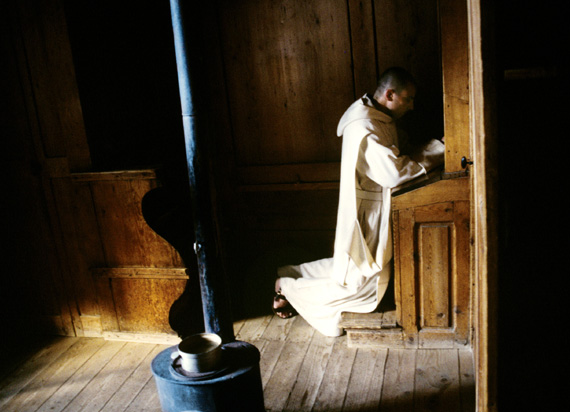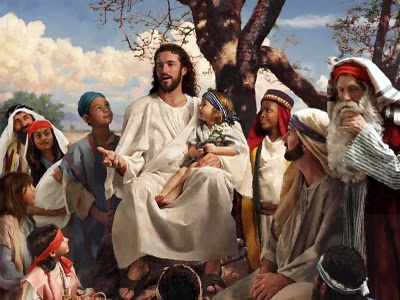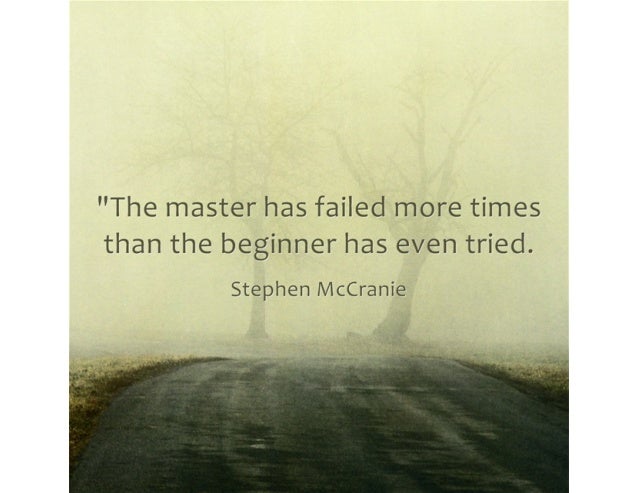 As much as I hate to admit it, there is a certain hierarchy in the spiritual life, as in the physical world. It is, perhaps, the most uncomfortable thing about the faith, that some things are true, others are not, and there is no getting around them when they are. The second most uncomfortable thing is the knowledge that I am fallible, and therefore I never truly know when I am right, and when I am wrong. So, in yesterday's discussion of Martha and Mary, I came to the conclusion that the "one thing needful" was love and the trust that must follow it. This takes different shapes, depending on the situation, but love is always the central thing.
As much as I hate to admit it, there is a certain hierarchy in the spiritual life, as in the physical world. It is, perhaps, the most uncomfortable thing about the faith, that some things are true, others are not, and there is no getting around them when they are. The second most uncomfortable thing is the knowledge that I am fallible, and therefore I never truly know when I am right, and when I am wrong. So, in yesterday's discussion of Martha and Mary, I came to the conclusion that the "one thing needful" was love and the trust that must follow it. This takes different shapes, depending on the situation, but love is always the central thing.However, this does not fully explain the fact that Jesus did say that Mary chose the "better part." In fact, throughout the history of the Church Mary and Martha have been considered archetypes of the two broad vocational categories, if you will, the contemplative and the active lives. Mary, of course, is the proto-contemplative and Martha is the proto-active. A good deal was made out of this distinction by the Church over the ages, in holding up the celibate, contemplative life as the beau-ideal of the Christian life.
Ah, but isn't that rather an old fashioned way of thinking about it? Don't we now know that everyone Apostolic Letter "Novo Millennio Ineunte", the Decree on the Apostolate of the Laity, by Pope Paul VI, and Chapter V of Lumen Gentium, the Dogmatic Constitution on the Church.) Wasn't Vatican II all about increasing the role and responsibility of the laity in the Church?
 |
| Dorothy Day and Mother Teresa 1979 |
Heck, go back to the beginning and didn't St. Paul say, "For the body does not consist of one member but of many. If the foot should say, “Because I am not a hand, I do not belong to the body,” that would not make it any less a part of the body. And if the ear should say, “Because I am not an eye, I do not belong to the body,” that would not make it any less a part of the body. If the whole body were an eye, where would be the sense of hearing? If the whole body were an ear, where would be the sense of smell? But as it is, God arranged the members in the body, each one of them, as he chose" 1 Corinthians 12:14-18.
Yes, but this does not change the fact that St. Paul was also the author of 1 Corinthians 7:32-34. And Jesus definitely did say that Mary chose the better part. Is the active life really second best?
I think the key is to be found in the two great commandments. We all know them: "You shall love the Lord your God with all your heart, all your mind, all your strength and all your soul," and "You shall love your neighbor as yourself." These are clearly hierarchically arranged. Love of God comes first, love of neighbor comes second. However, they are not arranged according to worth but according to primacy. First things first, if you will. Love of God comes first, love of everyone else comes second.
For some reason, and I suspect it is diabolical in origin, almost everyone Christian I know will read that and hear, "Love of God is more important, love of neighbor is less important." The implication is that there is a competition for limited resources (love) and God has first claim so when there is not enough love to go around, well, sorry family, but God gets His first. This understanding is widespread, pervasive, but is a straight up lie. Hence my suspicion that it is diabolical in origin.
In reality, there is not and can never be any sort of competition between creature and Creator, except in the imagination of the creature. "In Him we live, and move, and have our being!" There is no possible way in which we could ever have something that God needs, and there is no possible way God could ever not provide for His creatures what they truly need, and in any event, Love is the one thing that only multiplies the more you give it away. The Creator vs. creature dynamic is not a valid construct.
Competition, when it occurs, occurs in the imagination of the creature. The creature imagines that something is good for it, which God has warned is not, in fact, good for it. Promiscuous sexual activity or gossip, to pick two fairly common examples, one respectable, one slightly less so. These give pleasure, they make the creature feel good for the moment, so the creature thinks they are good. God says they are not, the creature does them anyway and reaps the consequences later on down the line. This is what we call "sin" and "punishment."
This brings me to what Fr. Michael E. Gaitley, MIC, calls "The Primacy of Contemplation." This is a concept that reconciles the two halves of the false dichotomy, admittedly by the rather mundane process of non-reinvention of the wheel. Simply put, pray first (commune with God), then go and do what He tells you (love your neighbor.) In the order of the Church as the Body of Christ we have contemplatives who listen to and commune with God, and we have actives who put that relationship into practice. This is an important area of study, but not really my topic at the moment. Right now I am concerned with the contemplative and active element in my own life.
The Primacy of Contemplation means that my work must flow from my prayer. My relationship with people must flow from my relationship with God. This is not because God is more important than people (He is, but He doesn't insist on His importance) but because people are so important that anything but the best is not good enough for them. Therefore our service must be the highest, noblest and most loving service, which means is must be united with Christ's service (from Bethlehem to the Cross). To do this we must be united with Christ. As Vatican II proclaimed in Perfectae Caritatis, "Apostolic activity must spring from intimate union with Him."
This means that prayer, spiritual reading and the sacraments, while not the focus of our lives (for laity in general) need to be the foundation of our lives. As busy as we may become (and I have become very busy at various times in my life) we must never be too busy for dedicated time for prayer. The world attacks prayer time. It always will by design. When you make the decision to set aside time (five or ten minutes or an hour, it doesn't much matter) every day for prayer, the devil will attack that time. He will make you unusually tired in the morning, try to get you to stay up late so you will say, "Just this once I really need those extra ten minutes of sleep, so I am going to hit the snooze button. I'll make up for it tomorrow." He will wake the kids up early and send them to interrupt. He will offer distractions, diversions and downright despair of ever praying worthily. (I don't know whether all of those interferences are directly as a result of the devil or just coincidence, but I have noticed that they tend to occur with surprising regularity. I know as a matter of history that when my alarm goes off I can count on having at least one good reason not to pray every single morning.)
The great thing is simply to keep trying, and not to be discouraged by failure. When prayer time is interrupted by tiredness, offer that as a sacrifice. When it is interrupted by other people, offer that to God. When you are secretly very glad that so-and-so came along and interrupted and got you off the prayer hook for today, and ashamed of that feeling, offer the feeling, and the shame and the interruption to God. Try again tomorrow, or later in the afternoon.
Set an alarm on your phone for 3 PM, and when it goes off simply say the Divine Mercy prayer or a short form of it, such as, "For the sake of His sorrowful passion, have mercy on us, and on the whole world." Pause, center your awareness on God (who has not ceased to be aware of you for all eternity) and look at Him with love.
Talk to Him, listen to Him, then do what He tells you, and you will become an active contemplative, probably without even knowing it.
You will also become a saint. Sweet deal!












